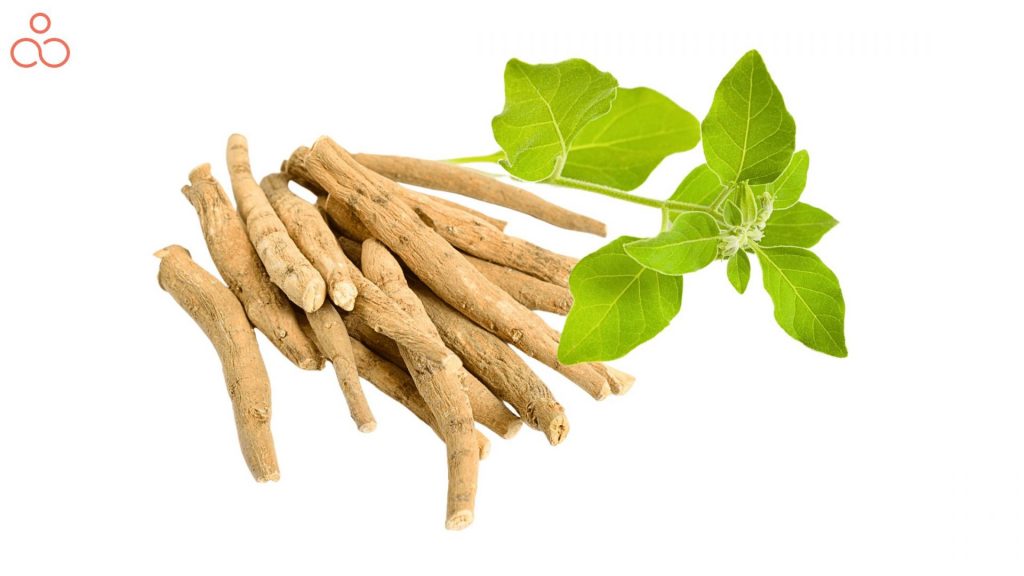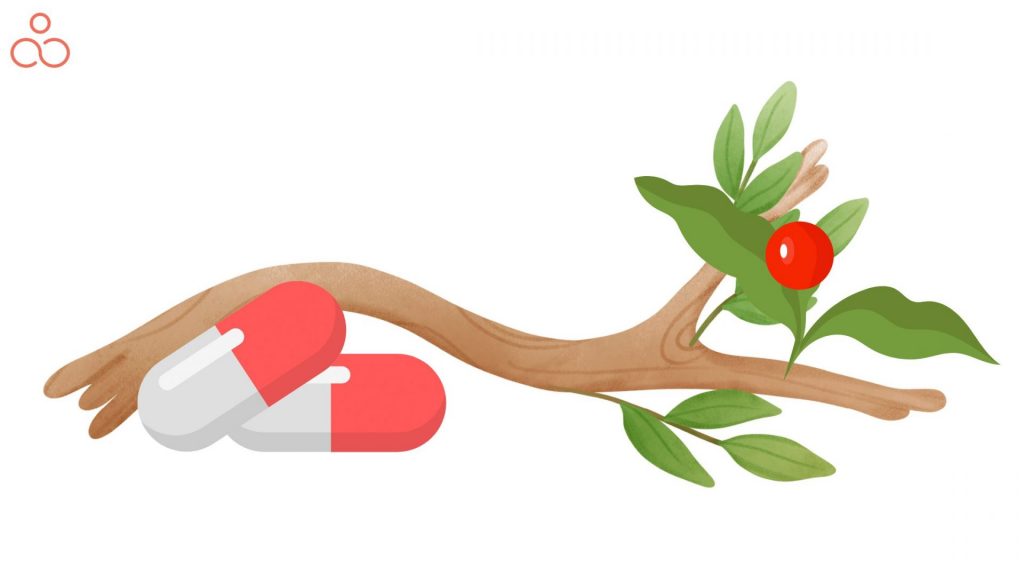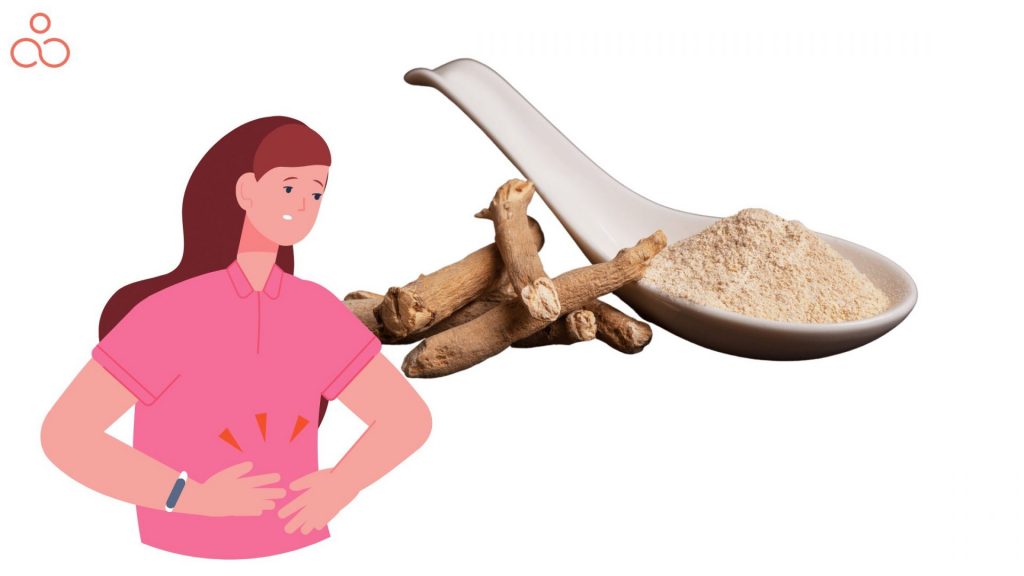Medically reviewed by Dr. Verma and Dr. Ram Raj
With many Ayurvedic medicines gaining limelight in the western world, Ashwagandha leads the league.
Ashwagandha is a traditional medicinal herb, often categorized as an adaptogen, meaning it can help your body resist physical and mental stress.
There are numerous benefits of Ashwagandha can provide to your brain and body. In fact, many people think Ashwagandha to be the one-stop herb for many health problems.
For instance, it can help treat various illnesses, including insomnia, aging, anxiety, and many others.
What is Ashwagandha?

Ashwagandha, also known as ‘Withania Somnifera,’ winter cherry, or Indian Ginseng, is an Ayurvedic herb with potent medicinal qualities. The term Ashwagandha combines two words: “ashwa,” meaning horse, and gandha meaning “odor.”
In Ayurveda, Ashwagandha is considered very important due to its various benefits. It is widely available across all seasons in the Middle East, India, and Africa.
In India, the roots and berries of this Ayurvedic plant were popular centuries ago and have been used since then for medicinal purposes. However, it has become popular in the United States and Europe in recent times.
Numerous research and studies have been conducted and are still being undertaken on Ashwagandha, and thus lies a future possibility of using it in addition to regular treatment.
Ancient History of Ashwagandha

Ashwagandha’s history can be traced back to roughly 6000 BC when it has its first mentioned in Rig Veda. The benefits and usage of Ashwagandha are frequently mentioned and well recorded in Vedas. In Sanskrit, the word ‘Ashwagandha’ means ‘the smell of a horse’ as the root of this plant smells like a horse.
Ayurvedic scholar Charaka in 100 BCE, talks about how consuming Ashwagandha makes one youthful, strong, and disease-free. As per ancient Vedic texts, Ashwagandha is deeply attributed to the longevity of life. Modern science recognizes the therapeutic effects of Ashwagandha and classifies the herb as an adaptogen, and it also has rejuvenating properties.
Benefits of Ashwagandha

To understand the benefits of Ashwagandha, one has to know about phytochemicals and their positive role in human bodies. Phytochemicals are chemicals inherent in a plant that protect itself from existing threats. Plants also need biological immune responses, and they also undergo biological changes not to let themselves get eaten by insects.
The best thing about Ashwagandha is that it has so many phytochemicals that can help the human body and its biochemical processes. Some phytochemicals help a plant grow as fast as possible and not get eaten. When intervening with the biochemical processes of the human body, these phytochemicals produce fantastic health benefits.
Here are the Top Benefits of Ashwagandha that are supported by science itself

1. It helps in decreasing stress and anxiety
As we already mentioned, Ashwagandha is an adaptogen, and it has the ability to reduce anxiety and stress in people. Many human studies were done to study the effects of Ashwagandha on the human mind. In a study done in 2019, researchers found that taking a daily dose of 240 milligrams (mg) of Ashwagandha extracts for eight weeks significantly reduced people’s stress levels and anxiety compared with a placebo group. It also marked a significant decrease in stress hormones like cortisol.
Now the question comes- Can Ashwagandha cure your stress?
Stress is part and parcel of human life, and we cannot run away from it. But there are medications available that can help us find an easy way to treat it, such as serotonin and botanical pills. However, such options often make the patient dependent on them, and it’s not easy to get off those medications. One needs to be disciplined, eat healthily, and sleep on time to fight off stress naturally. Unfortunately, many people are unwilling to put in the extra work due to work, children, and other responsibilities.
Ashwagandha is well known for its stress-relieving properties. Several studies have demonstrated Ashwagandha’s capacity to considerably reduce individuals’ stress and anxiety levels. Not only does it help in the reduction of stress levels in humans, but it also helps in improving sleep cycles. A study has shown that Ashwagandha can help enhance the quality of sleep. Human subjects who were given 300 mg of Ashwagandha extract twice daily for 10-weeks showed significant improvement in improving both sleep quality and sleep cycle and reducing anxiety levels.
2. Can Help in Controlling Blood Sugar and Excess Fat
Some clinical studies have found that Ashwagandha could be very effective in controlling blood sugar levels and reducing triglycerides. Triglycerides are fats from the food which is carried in the blood. There is a strong possibility that Ashwagandha might contribute to the regular treatment of Diabetes.
In another study, Ashwagandha has proved its mettle. In a test tube study, it was found that Ashwagandha was associated with increased insulin sensitivity in cells. People with schizophrenia had decreased blood sugar levels after taking Ashwagandha.
A study has shown that Ashwagandha is significantly beneficial in reducing stress levels and body weight management when taken at 300 mg twice daily for 8-weeks.
3. May Increase Muscle Strength and Stamina
Multiple studies have been conducted on the topic, and it has been found that Ashwagandha does have an impact on increasing muscle mass and strength.
Some researchers have provided observations regarding the increase in muscle strength for people who take Ashwagandha. A study showed reduced body fat percentage and cholesterol levels and increased muscle strength in males when given for 30 days.
Another study demonstrated that when males were given Ashwagandha daily for eight weeks and resistance training, it increased their muscle strength and raised testosterone levels.
4. It might increase testosterone and boost fertility in men
Ashwagandha can improve sperm count in men. Studies have pointed towards Ashwagandha ensuring proper production of male hormones that can help their partners become pregnant. The testosterone boost also leads to increased muscle mass in men.
A study was done on 75 infertile men wherein their sperm count, and motility increased drastically after taking Ashwagandha. Along with increased testosterone levels, men also saw an increase in antioxidants in their blood and a decrease in stress levels.
5. It could help in increasing memory
There is evidence in various studies that consumption of Ashwagandha leads to an increase in cognitive skills. People’s memory power increases, and also they can perform better cognitive skills. Based on that study, candidates who took the short psychomotor tests showed increased response time and better concentration skills while writing the tests after consuming Ashwagandha for a week.
6. It May Help in reducing inflammation
A study has shown that Ashwagandha can also help reduce inflammation in the human body. It also reduces the c-reactive protein( a protein made by the human liver, which is a marker of inflammation).
In a controlled trial study, it was found that the group which took Ashwagandha saw a 36% decrease in C-reactive protein, and it was significantly less when compared to the placebo group, which saw a decrease of just 6%.
7. It might possess anti-cancer properties
Animal and test-tube studies have concluded that Ashwagandha contains a compound called Withaferin that may help fight certain cancers. One such study indicates that Ashwagandha includes several compounds that may effectively prevent and treat cancer.
Based on another study, Withaferin is first believed to increase the development of reactive oxygen species or ROS in the cancer cells, which further disrupts their functioning. And additionally, cancer cells may become less resistant to apoptosis as a result of this.
Many animal studies also suggest that Ashwagandha may help prevent and treat various cancers, including lung, colon, and ovarian cancer.
8. May Promote Healthy Heart
Some studies have shown that Ashwagandha can boost heart health by lowering cholesterol levels and controlling high blood pressure and triglyceride levels. Also, by lowering cholesterol and triglyceride levels, Ashwagandha may help lessen the risk of heart disease.
These effects may also contribute to preventing obesity and high blood pressure, thus protecting heart diseases.
How can Ashwagandha be used as a medicine?

As far as scientific studies are concerned, every part of Ashwagandha seems to have medicinal benefits. The most common use of Ashwagandha is using it in powdered form or churna, and Ashwagandha churna is also used as a paste by combining water, ghee, milk, and honey.
There are several benefits of using the Ashwagandha powder. On top of that, some benefits include improvements in diseases such as leucoderma (a condition that causes loss of skin color in blotches), constipation, insomnia, rheumatism, nervous breakdown, and goitre (swelling on the neck due to enlargement of thyroid glands), etc.
Ashwagandha shrubs are equally beneficial. The leaves of Ashwagandha can taste bitter, but it’s rich in iron. It is extremely useful for a person suffering from health issues like iron deficiency and anemia.
Similarly, ashwagandha seeds help in the preparation of tonics like the Ashwagandharishta. It helps improve mental health problems like anxiety, hysteria, memory loss, etc. The seeds, when taken, also help in deworming.
As far as the potency of Ashwagandha as a medicine is concerned, it will be far more beneficial when we take it as a supplement. Supplements are stronger in comparison to herbs that are used for cooking. It is advised not to take Ashwagandha and other medicines if, by any chance, it interferes or can create health problems.
How does Ashwagandha benefit the skin?

Ashwagandha is an amazing plant for the well-being of your skin. It makes your skin glow and youthful. Ashwagandha possesses antimicrobial and antibacterial properties, and these are important in preventing new impurities from forming and helping treat existing blemishes. Furthermore, regular usage of Ashwagandha helps boost the production of collagen, which fights all signs of aging like wrinkles, dark spots, fine lines, and blemishes.
Ashwagandha contains compounds like withanolides (naturally occurring steroids) that may help clean all the impurities deep-seated in the skin. It can also help in managing several skin infections. Also, Ashwagandha helps in boosting some beneficial compounds like the DHEA (dehydroepiandrosterone sulfate). This compound helps in generating youthful skin.
Benefits of Ashwagandha for men

Ashwagandha is shown to be a testosterone booster medicine, and it has been traditionally regarded as a magical herb for men. Based on one study, Ashwagandha has been shown to improve sperm quality in infertile males by rebalancing their reproductive hormone levels.
Other benefits include increasing muscle mass in males and improving sperm count in men suffering from stress.
How does Ashwagandha benefit women?

Stress plays a crucial role in managing sensitive reproductive hormones in women that directly affect their fertility, libido, and menstruation cycle. Ashwagandha is proven to have a host of benefits for women, and its role in reducing stress is directly linked to the support and enhancement of women’s reproductive health.
Ashwagandha can help reduce cortisol, strengthen the Adrenal glands ( small triangular-shaped glands producing hormones), and promote the production of blood. As a result of healthy blood flow and hormone balance, good libido, menstrual cycle, and fertility can all be improved.
A 2015 study published in Biomed research found that 60 women who had difficulty having an orgasm and being aroused took 600 mg of Ashwagandha. They took doses for eight weeks, and at the end of 8 weeks, they were experiencing arousal and experienced improvement in their sexual function. Moreover, no adverse effects were found.
During menopause, a woman’s body goes through many changes, including hormonal imbalances accompanied by mood swings, anxiety, depression, and even hot flashes. In combination with other herbs, Ashwagandha is shown to treat many of these issues effectively. Also, it is believed to work on the endocrine system while reducing the symptoms of mood disorders and anxiety.
How does Ashwagandha benefit Children?

As men and women, Ashwagandha is quite beneficial for children and adolescents. Studies, as yet conducted on rats, have shown that it may help create a stronger immune system by increasing WBC (white blood cells) and platelet count in their bodies. Also, it may boost brain functioning and improve memory and information retention capacity. Studies also suggest that It may aid in producing antibodies, which improves the body’s response to a health threat.
Potential side effects of Ashwagandha

Ashwagandha is a well-tolerated herb and possibly safe if used in light to medium dosages. The positives of this plant are also trustworthy and promising. However, there have not been sufficient long-term studies to investigate its potential side effects if taken in large doses over the long term.
The review of 69 studies published in June 2020 in Journey of Ethnopharmacology suggests that Ashwagandha can have mild side effects like digestion distress, drowsiness, etc. No serious adverse effects were observed.
Since it comes from a non-toxic plant, it is safe to use if you take it in moderation or after consulting with your doctor. Also, it is strongly advised that intake of Ashwagandha should be halted when used with other medications, especially supplements, sedatives and digestive pills, etc.
If you face any side effects, you should immediately seek medical assistance.
Are they any limitations with the use of Ashwagandha?
The most obvious limitations of not taking Ashwagandha are special conditions like pregnancy, allergy, surgery, sensitive thyroid, etc. If you are in a special condition, it is strongly advised to consult your doctor or a physician before taking Ashwagandha.
What are the ashwagandha benefits when consumed with milk?

In Ayurveda, it is recommended to consume Ashwagandha with milk. As per Charaka Samhita, milk is a sweet substance for the human body, and it has a sweet post-digestive effect and is also sweet. Moreover, in Ayurveda, milk is considered the best carrier substance (Anupam) to transport herbs and formulas into deeper channels or tissues. Since milk can travel through the blood, bone plasma, and even reproductive tissues, it is highly advantageous to consume Ashwagandha with milk.
Also, both Ashwagandha and milk could be great rejuvenators, as they are nourishing and help in boosting strength.
How can vegans take Ashwagandha?
Vegans can either use soymilk or lukewarm water, mix the Ashwagandha in its powdered form (churna), and consume it to enjoy its benefits. Some people also mix a bit of Ashwagandha powder in their food.
FAQ’s about Ashwagandha
Is Ashwagandha a toxic plant?
No, it is a non-toxic plant and hence, safe to take.
When should one not take Ashwagandha?
Pregnant women, People with an upcoming surgery, sensitive thyroid, and also those with stomach infections or stomach ulcers should not take Ashwagandha as it may irritate their gastrointestinal tract.
When is the best time to take Ashwagandha?
Most people take Ashwagandha in a capsule or powder form that can be taken any time of the day.
How long does it take for Ashwagandha to start working?
When combined with a healthy lifestyle, Ashwagandha can positively impact the body in as little as two weeks.
Is it safe to consume Ashwagandha daily?
Although Ashwagandha is generally safe, some people should not take it unless their healthcare physician has permitted them.
What is the best way to consume Ashwagandha?
It is preferable to take Ashwagandha powder (churna) combined with warm milk before going to bed. Ashwagandha powder mixed with milk is said to soothe the nervous system, particularly after a long and tiring day.
Is Ashwagandha legal?
People can purchase Ashwagandha as a supplement in the USA and many european countries.
Conclusion
Ashwagandha is indeed a fantastic herb, and it has a host of health benefits. The application of the studies in Ashwagandha, however small, shows promising results.
Ashwagandha supplementation may be a simple and effective method to improve your health and quality of life. While numerous studies back up the advantages of Ashwagandha, this well-known stress reliever may also cause you some unpleasant side effects depending on your body and the dosage you take. Hence it is highly recommended to take. Hence it is highly recommended to take Ashwagandha only after consulting with your doctor or physician or do your due research before adding this magnificent herb to your daily routine.

